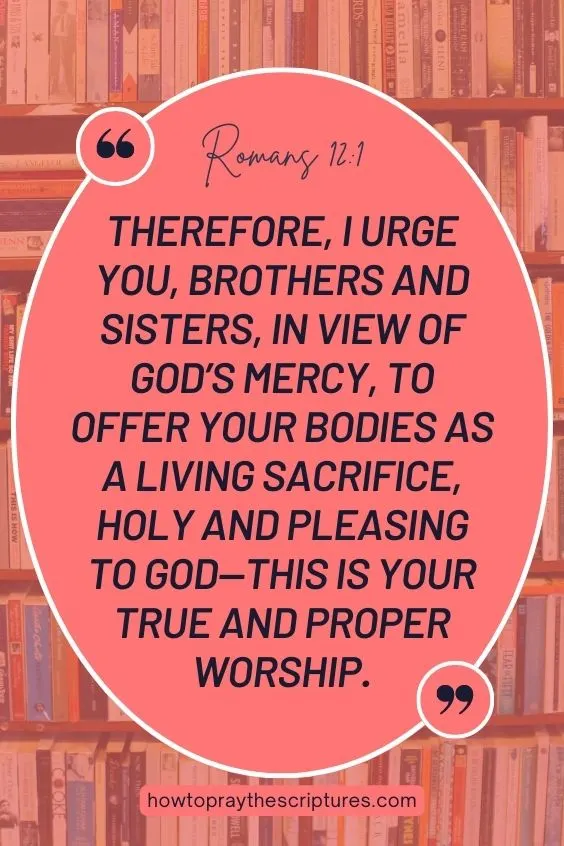Opening prayer, or meditative prayer as it is also called, is a brief time of reflection and sharing with others prior to the service. Opening prayer allows the participants to reflect on their day and enter more deeply into worship.
In the Christian faith, in order for prayer to be truly accepted by God, it must be done through the name of Jesus Christ. A leader must pray for devotion before beginning any type of guided prayer with God. Before praying, the leader needs to establish a state of meditation with God through an act of silence.
John 14:13-14
13 And I will do whatever you ask in my name, so that the Father may be glorified in the Son.
14 You may ask me for anything in my name, and I will do it.
says, “You may ask me for anything in my name, and I will do it.” Jesus’ followers still can pray this prayer because of Christ’s sacrifice; we can be with God if we accept Him. There must be faith that God will move in our prayers through Jesus.

How to Lead Opening Prayer
I want to share with you a few concrete ways to lead an effective prayer. These can be used on a personal or on the prayer team level, and they can be useful for individuals and groups of people. This method will allow you to have a more meaningful prayer ministry if done correctly. Read on to learn more about how to lead an opening prayer at the church.
How to Lead an Opening Prayer at Church
Opening prayer is a time when the congregation gathers together in prayer. It is typically led by the pastor or a layperson, and it can be a way for members of the congregation to express their gratitude and praise. In order to successfully lead an opening prayer at church, you’ll need to know how to use your voice effectively and provide a good example for others.
Prepare Ahead of Time
This is important because you want to be confident in what you are saying, and having a good idea about what you want to say beforehand will help with that. Try to come up with a list of things you can use as bullet points or points of reference when you lead the opening prayer at church. These points can be used as a template if they help guide your thoughts while preparing.
2 Timothy 2:21
Those who cleanse themselves from the latter will be instruments for special purposes, made holy, useful to the Master and prepared to do any good work.
shows that if anyone cleanses himself from what is dishonorable, he will be a vessel of honor, sanctified, purified, useful to the Master, and prepared for every good work that God has designed for him.

How to Lead Opening Prayer
Consecrate Yourself
Consecration is the key to living a truly established and fulfilling life. This is not just about setting up a wall for your spiritual castle but about dedicating yourself to God. Consecration is the supreme act of worship.
Romans 12:1
Therefore, I urge you, brothers and sisters, in view of God’s mercy, to offer your bodies as a living sacrifice, holy and pleasing to God—this is your true and proper worship.
says that we are to present our bodies as a living sacrifice, holy and acceptable to God, and this is our spiritual worship. So often we try to separate the two, but they really go hand-in-hand. If we want to be used by God and if we want to have an impact on His kingdom, it all starts with consecration. This is more than just a verse; it’s a lifestyle. Giving back is integral to living out your faith and loving others, and it can be applied to almost any aspect of life.

How to Lead Opening Prayer
Choose an Opening Statement
Opening statements are important because they give everyone something to focus on during their prayers and thoughts. Start by saying something like: “Today we come together in the name of love and peace.” This will give people a goal while they’re praying, which can help keep them focused throughout the service. Here is another example:
“We’re here today because we believe in the power of God’s love. We come together as Children of God through the Sacrifice of Jesus Christ. We’ve been washed clean through Christ’s suffering and death on the cross. And now, by His grace, we can call Him ‘Abba Father,’ and whatever we petition or ask for we will receive it according to His will.”
Romans 8:15
The Spirit you received does not make you slaves, so that you live in fear again; rather, the Spirit you received brought about your adoption to sonship. And by him we cry, “Abba, Father.”
shows that the Spirit Himself bears witness with our spirits that we are children of God. So now, when we open up and pray, let us remember that we are no longer slaves to sin but have been adopted into His family. We have direct access to the Father through Christ, and whatever we ask for in prayer, we will receive it according to His will.
![The Spirit you received does not make you slaves, so that you live in fear again; rather, the Spirit you received brought about your adoption to sonship.[a] And by him we cry, “Abba,[b] Father.](https://howtopraythescriptures.com/wp-content/uploads/2022/12/How-to-Lead-Opening-Prayer-4.jpg.webp)
How to Lead Opening Prayer
Read Through the Bible Passages
Reading through Bible passages is a great way to start a prayer. These must be relevant to your life or to what you are praying about; this will help you gain insight into what God wants you to pray about. Then go through all the Bible readings for that day or week. You say something such as this:
“Before we start praying, I just want to read these passages. Philippians 4:5-7 is a great reminder that God is near us and that we don’t need to be anxious about anything because we can bring all of our requests to Him in prayer. It’s also a reminder that we should do so with thanksgiving when we pray. As we pray, let’s remember these things and ask God to help us lead this time of prayer with humility and grateful hearts.”
Make an Invitation to Pray
Invite people to stand or sit where they feel comfortable. If you want them to stand in a circle, make sure there are enough chairs so that everyone can find one—even if they have to split up into two groups and sit at opposite sides of the room.
“Let us pray.” (Pause for a moment of silent prayer.) “Heavenly Father, we thank You for the gift of Your Son, Jesus Christ. We praise You for His life and death on the cross, which has given us the gift of eternal life. We ask that You would be with us today as we worship You and praise Your name. May Your Spirit fill us with joy and peace as we lift our voices to You in prayer and song. In Christ’s name, Amen.”
Matthew 18:20 states that there is an assurance that God is present when we come to pray. This promises us that God will meet us where we’re at, whether it be in a group or individually. When we pray together as a group, it allows us to encourage one another and be transparent and accountable to one another. It is a chance for us to grow closer to God and each other.
Be Brief
A short prayer is always better than a long one! If you feel like going on forever, try taking a deep breath before starting your next sentence—and then another one when you’re done with that sentence! (You might even want to take some deep breaths while other people are praying!)
Here is an example of a brief prayer in leading the congregation:
“Heavenly Father, we come to You today in thanksgiving for Your many blessings. We ask that You would be with us as we worship You and learn from Your Word. May Your Spirit guide us in all truth. Amen. Thank You for the unconditional and unfailing love You give to us. May we do Your will as we pray in Jesus’ name, Amen.”
Matthew 6:5 emphasizes that what matters most is a genuine prayer. Sincerity is the key to opening the door of God’s blessings. So, when you’re praying, make sure your motives are clear and true.
Pray from Your Heart
Your prayer doesn’t have to follow any particular format or be written down beforehand; just let your words flow as they come out of your mouth (or mind). Don’t use a script or memorize prayers. Pray from the heart and speak from your own experience in your everyday life.
“Dear God, we are so grateful for all the blessings You have given to us. We know that we are not perfect and make mistakes, but we are trying to follow Your will. Please help us to be better people and to do Your will in all things. We pray for strength in times of trouble, wisdom in times of decision, and courage in times of fear. We pray for healing for those who are sick, for comfort for those who are grieving, and for peace for those who are troubled. We pray for Your guidance and protection in all aspects of our lives. We pray that we may always remember that You are with us and that we are never alone. In Jesus’ name, we pray, Amen.”
James 4:3 tells us that when we pray, we should ask God for what we need, and He will give us what we ask for. But first, we need to check our motives. Why do we want what we are asking for? Is it for God’s glory or our own?
What Do You Say Before Opening a Prayer?
There are a few things you should keep in mind when preparing to lead an opening prayer. First, remember that prayer is a conversation with God. You should take a moment to quiet your mind and focus on Him before beginning to speak. Second, it is helpful to have an idea of what you would like to say before starting to pray. This will help you to stay focused and on track. Finally, it is important to be respectful and humble when speaking to God. Remember that He is the Almighty and all-knowing; we are merely His children.
When you’re ready to begin, start by saying, “Heavenly Father, we come before You today…” Then continue by expressing your gratitude for His blessings, interceding on behalf of others, and making any other petitions you feel led to make. Be sure to conclude by saying, “In Jesus’ name, Amen.”

How to Lead Opening Prayer
Leading the opening prayer can be a wonderful way to start the day or event on a positive note. It is an opportunity to give thanks, ask for guidance, and petition God on behalf of those present. However, it is important to remember a few things in order to make the most of this time. First, it is vital to be prepared mentally and spiritually before beginning. This means taking a few moments to clear your mind and focus on what you’re about to do. Once you’re in the right frame of mind, it’s time to begin.
Begin by offering a brief introduction and then launch into your prayer. Be sure to keep your tone respectful and humble throughout. When praying, you can cover a variety of topics, such as thanksgiving, interceding on behalf of others, and making any requests you may have. Be specific in your requests, and don’t be afraid to get personal. The more specific you are, the more likely it is that God will answer your prayer.
Then, once you’ve covered all the topics you want to address, close your prayer with a statement of finality, such as “in Jesus’ name” or “amen.” Simply take a moment to reflect on what you’ve just said before moving on with your day.
A prayer is a powerful tool that can help you get through the tough times and enjoy the good times even more. By following these simple tips, you can ensure that your prayers are both meaningful and effective.
1 Thessalonians 5:16-18 states that we should “pray without ceasing.” This doesn’t necessarily mean that we need to be praying out loud all the time, but it does mean that we should always be ready and willing to pray. Whenever we have an opportunity to pray, whether it is before a meal, during a church service, or in our personal devotions, we should take advantage of that.
Conclusion
This is a beautiful reminder that prayer isn’t just a personal conversation with God—rather, it’s about being in communion with one another. And when our prayers are united with those around us, they are even more powerful than if we were alone. We also see this in the Bible, as it says that two or three of us gathered in Christ’s name can be an incredibly powerful force.